Sea Machines Debuts AI-ris Computer Vision for Commercial Vessels
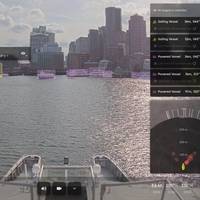
Marine perception sensor aims to provide high-def situational awareness to eliminate at-sea collisions and allisionsSea Machines Robotics unveiled AI-ris (Artificial Intelligence Recognition and Identification System), a new marine computer-vision navigation sensor designed to improve safety and performance while vessels are underway. Sea Machines’ AI-ris uses digital cameras and AI-processing to detect, track, classify and geolocate objects, vessel traffic and other potential obstacles in the majority of operational conditions, day or night.
Canada's New Oil Spill Response Boats Powered by Scania
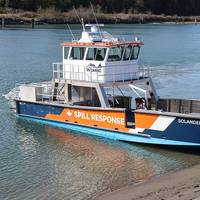
Engine manufacturer Scania said it has been selected by the Western Canada Marine Response Corporation (WCMRC) to power four 52-foot oil spill response landing crafts.Currently in production by family-owned Burlington, Wash welded aluminum boat manufacturer the William E. Munson Company, the vessels are powered by twin keel-cooled 750 HP Scania DI13-liter 088M engines with Twin Disc 5095 marine gearboxes, supplied by distributor Cascade Engine Center. Propulsion is provided by Hamilton 403 waterjets. This combination offers a top speed of 35 knots at full power.
Autonomy on Trial
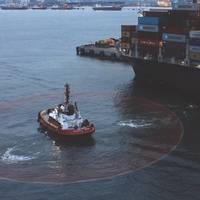
When discussing the arrival of autonomous workboats, many – especially those developing the technologies that enable them – say it’s is not a matter of if, but when. In fact, autonomous harbor tugs are already being put to the test in Singapore, where authorities hope to establish the technological infrastructure to enable fully autonomous ship operations. In the U.S., an autonomous vessel was shown to be able to respond to marine oil spills.But is autonomy really the future?
Brazil Ship Collision Reveals Offshore Regulatory Gaps
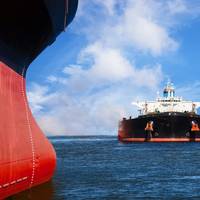
Brazil has more than doubled the number of risky ship-to-ship oil transfers this year, but its monitoring of such offshore maneuvers is lax, to a point where a July 2017 collision between two tankers was not reported, according to a Reuters review of government and shipping records.Transfers are projected to keep rising as the country's deep-water discoveries have lured major companies including Exxon Mobil Corp and Royal Dutch Shell Plc to recent offshore auctions. During these maneuvers, ships pull alongside one another and oil is transferred to a vessel via high-pressure hoses.
A Turning Point in Oil Spill Recovery
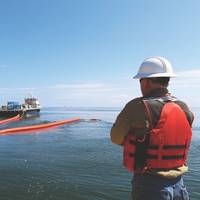
Cleaning up marine oil spills can be a challenge as there are various types of oil spilled but only a few effective recovery methods. The three main technologies for oil spill recovery for inland and offshore waters are mechanical, insitu burning (ISB), and dispersant application. Absorbent booms and pads may also be used, but they are more effective for small fuel spills. Mechanical recovery, usually an oil skimmer, is a device that skims contained floating oil and transfers the recovered oil to a storage container or vessel.
Op/Ed: The Spill Response Industry's Greatest Challenges

Devon Grennan, president and CEO of Global Diving & Salvage, and president of the Spill Control Association of America (SCAA) asks the tough questions. What are the biggest challenges the spill response industry faces in light of the current political and economic climate in the United States? And what is SCAA doing to meet these challenges? I see the primary challenge that the spill response industry – as well as SCAA’s membership – currently has is to manage expectations and competing interests at a unique point in our nation’s energy renaissance.
Exhibition on Risk of Oil Pollution from Ships
The International Group is collaborating with the International Maritime Organization (IMO), International Oil Pollution Compensation Fund (IOPC) Funds and other industry organisations to produce an exhibition at the IMO to mark the achievements of the international community over the past 50 years to achieve a sustained reduction in major oil spills from ships; to establish effective systems for preparedness and response if there is an incident; and to create a comprehensive mechanism for providing compensation. In 1967, the grounding of the Torrey Canyon focused the world's attention on the risks and environmental impact of major marine oil spills.
Canada Oil Spill Program Hit by Cheap Crude
The two-year oil price crash has hurt a Canadian government program that funds research on oil spill cleanups, resulting in fewer applicants than expected, a senior federal official said. As a result, the government will expand the scope of its Oil Spill Response Science Program and open a second call for applications this month, Marc Wickham, Natural Resources Canada's director of energy science and technology programs, said in an interview late last week. The program funds research that improves cleanup methods for marine oil spills. Those eligible include production, pipeline and shipping companies in the energy sector. Wickham spoke with Reuters after it obtained details of the program's amendment through an access-to-information request.
EPA Awards 10th Grader for Work on Marine Oil Spills

Oregon 10th grader Sahil Veeramoney received the U.S. Environmental Protection Agency (EPA), Region 10 President’s Environmental Youth Award for his development of a novel and efficient method to clean up marine oil spills. Veeramoney, a student at Oregon Episcopal School in Portland, Oregon, developed a method to remediate marine oil spills after studying the environmental impact of the 2010 Deepwater Horizon oil spill that occurred in the Gulf of Mexico and subsequent oil spills.
Maritime NZ Oil Spill Response Review: Submissions
Maritime New Zealand (MNZ) says it invites submissions on its draft updated New Zealand Marine Oil Spill Response Strategy 2014 (the draft Strategy). The draft Strategy, (available at http://bit.ly/1pe6p46) is based on the current version but substantially updated to include lessons learned nationally and internationally in recent years and follows discussion with regional councils, the community and iwi, and industry at a series of public held earlier this year. The safety agency points out that it is important to note that the strategy does not cover the permitting and approval process for oil and gas exploitation. Neither does it cover emergency response to other hazardous and noxious substances. These issues are “out-of-scope” of this strategy.
IMO Releases Agenda for MEPC
The Marine Environment Protection Committee (MEPC) of the International Maritime Organization (IMO) is expected to adopt proposed amendments to the MARPOL Annex VI regulations to reduce harmful emissions from ships, when it meets for its 58th session from October 6-10 at IMO Headquarters in . The Committee will also continue its work on developing a mandatory regime to control greenhouse gas (GHG) emissions from international shipping. The Committee has a packed agenda, which also includes the consideration of the draft ship recycling convention and issues relating to the implementation of the 2004 Ballast Water Management Convention. The draft revised Annex VI to the MARPOL Convention was agreed at the last MEPC session in April.
Roundtable on Cruise Ship Pollution to be Held in January
A roundtable discussion will be held on January 21 at the Hilton Hotel at Harbor Island, in San Diego, Calif. The discussion, sponsored by Pacific States/British Columbia Oil Spill Task Force, will focus on preventing pollution from cruise ships. discharges from passenger cruise ships can be just as damaging to ecosystems and deadly to wildlife. into marine environments. regulatory agencies, environmental organizations, and the cruise ship industry. prevent future pollution incidents.
Marine Oil Spills and Response Options
Marine oil spills are subject to natural processes, which alter oil's physical and chemical properties. These factors ? as well as the type of oil spilled, the magnitude of the spill, and the physical conditions of the spill site ? determine the appropriate response for spill cleanup. Response options include mechanical recovery, chemical treatment and in-situ burning. Every spill scenario is unique and constantly changing. Careful assessment by experienced personnel is required for effective response performance. Natural spreading of the oil spill is a major factor in determining the response option most likely to succeed. The number and availability of personnel and equipment is also a major consideration.
MEPC Progresses on Key Issues
The Marine Environment Protection Committee (MEPC) of the International Maritime Organization (IMO) made progress on a packed agenda when it met for its 56th session from 9 to 13 July in London. Among a series of important decisions, it agreed to commission a study into the impact of proposed measures to reduce air pollution from ships. The Committee also further developed the proposed Ship Recycling Convention, discussed issues relating to the implementation of the 2004 Ballast Water Management Convention and adopted a number of amendments to the MARPOL Convention. Mr. Michel Jarraud, Secretary-General of the World Meteorological Organization (WMO) addressed the opening session of the Committee, at the invitation of IMO Secretary-General Mr. Efthimios E. Mitropoulos.
Our Compass Always Points to Safety:
America’s tugboat, towboat and barge industry moves 800 million tons of cargo a year on our nation’s inland and coastal waterways. Moving this cargo safely – minimizing risks to people, property, and the environment -- is the industry’s number one goal. The Coast Guard-AWO Safety Partnership, a groundbreaking public private partnership between the U.S. Coast Guard and The American Waterways Operators, the national trade association for the tugboat, towboat and barge industry, tracks trends in towing industry safety performance. Using government data from the U.S. Coast Guard and U.S. Army Corps of Engineers, the Partnership monitors vessel casualties, oil spills, and crew fatalities, promoting continuous improvement and providing focus to Coast Guard-industry safety initiatives.
S. Korea Expected To Lift Inspection Ratio To 30 Percent
South Korea is expected to lift its inspection ratio for targeted substandard ships to 30 percent by the end of the year, according to Joon-Soo Jon, a university professor and advisor to Korea's maritime ministry. The country raised its inspection ratio to 25 percent in the first half of 1999, from 16 percent last year, but is unlikely to achieve a 50 percent goal set for 2000, Joon-Soo said. "Our goal is to achieve 30 percent by the end of the year and we might hit 40 percent by the end of 2000," he said. Ships being targeted were likely to be registered under the Panama, China, Belize, Honduras, St. Vincent, Russia or Liberia flags, he said.







